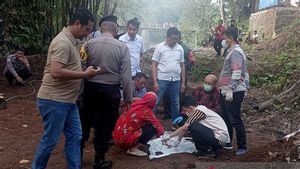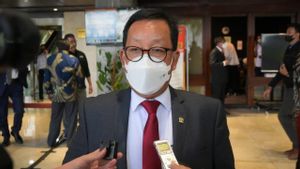JAKARTA - The Health Bill, which is being discussed in parliament, is considered to accelerate the process of digitizing and technological innovation in the health sector. Because in implementation, it will integrate health information systems, present and guarantee the protection of quality individual health data.
"We imagine that health with a referral system and service networks is not just a conventional reference or things related to hospital service facilities, but there must be a digitization of one health record or electronic health record," said Health Policy Observer, Dr. Hermawan Saputra, MARS. CICS, Friday 16 June.
The Health Bill is a DPR initiative bill which is considered to be a breakthrough for the state to meet the needs of health workers, especially doctors. This bill is also said to be a solution to the overlap of regulations in the health sector that triggers many programs that cannot be implemented in the field.
Another advantage in the Health Bill is the significant cooperation between clinical, research, and industry to create health innovations, as well as encourage the use of health technology, including integrated biomedical technology.
"The government has a discourse towards one piece of data on health transformation and this is very important because previously in existing regulations, it has not been specifically regulated, even though it is important for us to put forward," said Hermawan.
According to the General Chair of the Elected PP of the Indonesian Public Health Expert Association (IAKMI), the Government can increase capacity and strengthen health transformation if the Omnibus Law Bill is passed. This includes, said Hermawan, for equal distribution of infrastructure and technology throughout Indonesia.
"Of course there are many things, including how we will also organize programs to strengthen health resources, and accelerate the production of health workers by paying attention to equity and equality," he explained.
It is known that in 2022, Indonesia already has 56 units of biotech and genome sequencing medical devices spread across 41 regional laboratories in Java, Sumatra, Kalimantan, Sulawesi, Bali, and Nusa Tenggara, as well as Maluku and Papua.
Hermawan said the low health innovation had an impact on the high import rate of health technology products. Among them are imports of raw materials for drugs which reach 90 percent as of 2019.
Not only that, 88 percent of medical device transactions in the electronic catalog are still imported, and Gross Domestic Product (GDP) for research and development in 2020 is only around 0.3 percent.
اقرأ أيضا:
"Well, all of this must have a breakthrough so that the pace of community needs for services and health resources is adequate and of high quality," explained Hermawan.
With technological innovation in the health sector, Indonesia's stuttering against a pandemic like at the beginning of the outbreak of the Covid-19 virus is expected not to happen again. Hermawan reminded that at that time the government was made to stutter because the system and rules were not yet capable.
"As far as we can see, in the previous law, this is not considered. Even in the realm of professions it should be fought for," said the Epidemiologist.
On the other hand, the urgency of the Omnibus Law Health Bill can also be seen in relation to the very important budget alignment. This is related to the health budget from the Central Government to the smallest level in the region which certainly has an impact on public health services.
"If we look at the so-called SPM (Minutral Service Standard). On the health sector service standard, it is an inherent and inseparable concurrent part of the performance of the Regional Government (Pemda)," explained Hermawan.
"So if the regents, mayors and governors want to perform well, then one of the achievements is to fulfill the SPM and it must be related to the allocation of policies in favor of health. Both in terms of budget, resources, and community health empowerment programs," he continued.
With the Omnibus Law method, the Health Bill will simplify regulations in the context of harmonizing laws and regulations regarding the health system in Indonesia. The use of the Omnibus Law method as an effort to harmonize laws and regulations is also able to suppress sectoral egos which sometimes cause opposition between one statutory regulation and another statutory regulation.
Not only that, the Omnibus Law which was formed using a modified method is also considered to make laws and regulations adapt to real conditions in society.
Hermawan assessed that the omnibus law in the Health Bill can be a comprehensive rigid rule for regulating the national health system. Including in terms of medical practice, nursing, guidance, and the practice of other medical personnel whose current rules stand alone.
The Health Bill is also said to accommodate efforts to recognize various professional clumps in various fields of public health. Hermawan said the most important thing related to this issue was how health workers should be at the forefront when a public health emergency occurs due to the Covid pandemic.
"So we are looking for epidemiologists, health investigators, surveillance personnel, when the Covid-19 pandemic occurs, it is very difficult to find," said the health practitioner who graduated from the University of Indonesia.
Not to mention being combined with health promoter staff, then how is the aspect of environmental health expertise included the narrative for health and communication policies. All of that must be covered by a regulation," added Hermawan.
The Lecturer of the Postgraduate Study Program for Public Health Sciences Uhamka Jakarta also appreciated the DPR for initiating the Health Bill. Moreover, according to Hermawan, the DPR has opened the widest possible space to absorb public aspirations related to the bill initiated by the DPR.
"This is important so that the public's right to health services is well accommodated in the law which is also in line with our constitutional state," he said.
"The synchronization of the efforts made by the DPR is a stimulus for the Government as a partner to pay attention to the interests of the community, especially interests in terms of health," added Hermawan.
He added that aspiration absorption must be carried out with caution and proportionality, both from the general public, experts, and health practitioners. Hermawan hopes that the absorption of aspirations in the process of discussing the Health Bill can produce comprehensive regulations.
"So we hope that prevention, education, and promotion will be prioritized as a philosophy in guaranteeing a good and healthy environment," he appealed.
"If this is done and continuously escorted by what has been voiced by the DPR, it is a sign that we really see a commitment to improve the national health system through this bill," concluded Hermawan.
The English, Chinese, Japanese, Arabic, and French versions are automatically generated by the AI. So there may still be inaccuracies in translating, please always see Indonesian as our main language. (system supported by DigitalSiber.id)

















